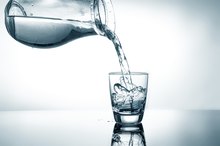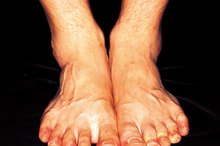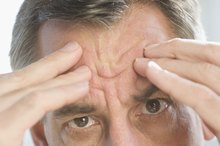Correct Liquid Intake With Lithium
Lithium is an oral medication used to treat the manic episodes of bipolar depression. Symptoms of mania include hyperactivity, aggression, anger and poor judgment, as well as a reduced need for sleep. Lithium affects the way that sodium chloride (salt) moves in and out of the body's cells. Since sodium also affects how water moves in the body, salt and fluid intake is important for people who take lithium. You must drink enough to prevent dehydration and consume the same amount of salt each day.
Sodium, Water and Lithium
Your body uses sodium as part of a system to manage fluid levels in the cells. If you eat a lot of salty foods and your sodium levels rise, you are likely to feel more thirsty than usual. If your body is producing excessive amounts of urine, you may drink extra fluids to keep up with the high output and the excessive fluid can wash electrolytes such as sodium out of the body. The amount of salt you consume also can affect the level of lithium in your bloodstream.
- Your body uses sodium as part of a system to manage fluid levels in the cells.
- If your body is producing excessive amounts of urine, you may drink extra fluids to keep up with the high output and the excessive fluid can wash electrolytes such as sodium out of the body.
Urine Output
How to Stop Lithium Weight Gain
Learn More
A healthy person will produce about one to two liters of urine each day, according to Harvard Medical School. If you produce more than three liters a day, that is considered polyuria, or excess urine production. Lithium makes the kidneys less able to concentrate urine, so you produce more urine and need to drink more water to keep up with the extra fluid loss. If you don't drink enough to keep up with the high output, you can become dehydrated and develop lithium toxicity -- high levels of lithium in the blood.
- A healthy person will produce about one to two liters of urine each day, according to Harvard Medical School.
- If you don't drink enough to keep up with the high output, you can become dehydrated and develop lithium toxicity -- high levels of lithium in the blood.
Factors that Affect Fluid Intake
People have different fluid intake needs. If you live in a hot climate or exercise regularly, you need to replace fluid lost through perspiration. Vomiting or diarrhea can increase fluid output and you may be unable to take in enough fluid. The average adult male in a temperate climate needs about three liters, or 13 cups, of fluid each day, according to the Mayo Clinic. Women need about two liters or nine cups. The Mayo Clinic recommends that you drink an extra 400 to 600 milliliters for intense exercise lasting less than an hour.
- People have different fluid intake needs.
- If you live in a hot climate or exercise regularly, you need to replace fluid lost through perspiration.
Too Much Fluid
Electrolyte Imbalance and Burning Urine
Learn More
Drinking too much water can also cause problems. Your urine can become diluted and you will lose sodium, which can cause symptoms of hyponatremia, or low sodium. This is not generally a problem for most people, but since lithium can make you thirsty, you should pay attention to your intake and not drink too much. Excessive thirst and high urinary output can be signs of lithium toxicity.
- Drinking too much water can also cause problems.
- Your urine can become diluted and you will lose sodium, which can cause symptoms of hyponatremia, or low sodium.
Considerations and Warnings
The doctor who prescribes your lithium will tell you how much water you should drink 5. You will need to monitor your health and adjust the total for situations that may make you dehydrated, such as illness or hot weather. If you can't take fluids for some reason, notify your doctor immediately. You may need intravenous fluids. Lithium can be toxic to the kidneys and cause permanent damage. If you are very thirsty or urinating much more than usual, notify your doctor.
- The doctor who prescribes your lithium will tell you how much water you should drink 5.
- You will need to monitor your health and adjust the total for situations that may make you dehydrated, such as illness or hot weather.
Related Articles
References
- Drugs.com: Lithium
- Austin Community College: Fluid/Electrolye Balance
- Cleveland.com: Preventing Kidney Damage among Lithium Patients: A Netwellness Column
- MayoClinic.com: Water: How Much Should You Drink Every Day?
- Hedya SA, Swoboda HD. Toxicity Lithium. Updated April 14, 2019.
- Altschul E, Grossman C, Doughtery R, et al. Lithium Toxicity: A Review of Pathophysiology, Treatment, and Prognosis. Practical Neurology. March 2016:42–45.
- Lithium Toxicity. U.S. National Library of Medicine. Updated December 2, 2019.
Writer Bio
Beth Greenwood is an RN and has been a writer since 2010. She specializes in medical and health topics, as well as career articles about health care professions. Greenwood holds an Associate of Science in nursing from Shasta College.









